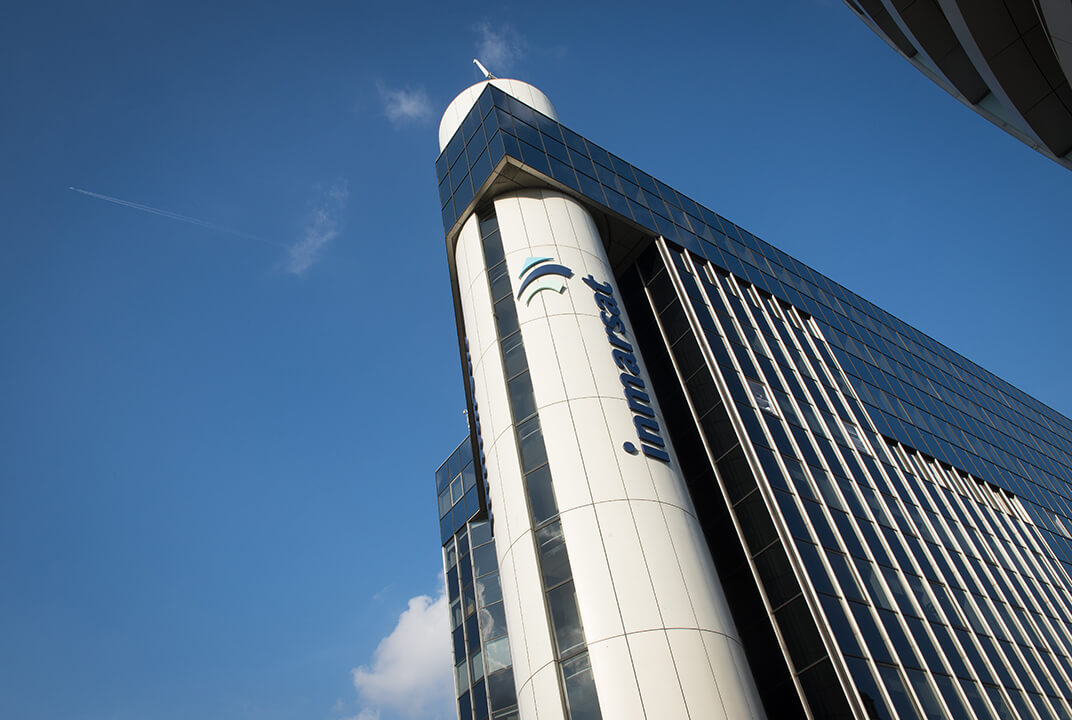On 30 May 2023, Viasat Inc. acquired the Inmarsat Group of companies via Connect Topco Limited, a holding company in the Inmarsat structure. Following integration of the combined organisation, it is the intention to report on all UK entities (Inmarsat and Viasat) through one combined statement.
We have policies and governance procedures in place to ensure that modern slavery does not occur in our own business or supply chain, and we are committed to running our business responsibly, including a zero tolerance approach to modern slavery. We are committed to taking appropriate steps to ensure fundamental rights and freedoms are respected.
This statement seeks to outline actions and progress undertaken during the financial year ended 31 December 2022 and is the seventh statement the Inmarsat Group has published in accordance with the Modern Slavery Act 2015.
Our US Government Business Unit sits behind a proxy wall to ensure its independence. This statement relates to the Inmarsat Group exclusive of our US Government Business Unit who manage their own procurement processes, policies, risks and training separately. Whilst separate, similar monitoring and diligence standards are rigorously applied.
1. Structure of the organisation
Inmarsat is a leading provider of global mobile satellite communications services headquartered in London with around 1,800 employees. Since 1979, Inmarsat has been providing reliable voice and high-speed data communications to governments, enterprises and other organisations, with a range of services that can be used on land, at sea or in the air. Inmarsat operates around the world, with a presence in the major ports and centres of commerce on every continent.
1.1. The Inmarsat Supply Chain
Given the scale of our company we rely on an international supply chain. Our suppliers range from small and medium sized enterprises to multinationals. During 2022 we spent $604m with 1,500 suppliers around the world to meet our customers’ needs. Our key areas of external spend during 2022 relates to satellite manufacture and launch vehicles. There was also significant spend on products and systems which includes our ground infrastructure, professional services, insurance and market access and licence costs. The remaining expenditure is made up of a wide variety of goods and services procured to support our general business and administrative functions, including facilities, IT, marketing and travel.
We are not a mass-market manufacturer and do not directly own or operate large factories or other production facilities. We do offer our customers a range of terminals that carry the Inmarsat logo; however those devices are manufactured on our behalf by third party suppliers according to our specifications. We do not own, operate directly or control the manufacturing plants that make Inmarsat branded hardware, nor are we a handler of raw materials or commodities.
Procurement is a highly centralised function within the business. All of our supplier data (direct and indirect) is under the remit of the Global Procurement team. The procurement process is designed to ensure fair treatment of suppliers though our sourcing programme and once on- boarded managed through our Supplier Relationship Management programme. The majority of our external spend is managed by our VP Global Procurement. Procurement also have a Procurement Sustainability strategy outlining how Inmarsat and its supply chain intend to reduce its absolute Scope 3 emissions in line with the UN Paris Agreement.
2. Polices and practices
2.1. The Inmarsat Code of Business Conduct and Ethics
The Inmarsat Code of Business Conduct and Ethics sets out the principles to which all Inmarsat’s staff and contractors are expected to adhere and advocate in meeting these standards. This applies to Inmarsat Group Holdings Limited, and all its subsidiaries including its directors, officers, employees and contractors and aligns our policies, culture and legal obligations into one document.
2.2. Human Rights Policy
The Inmarsat Human Rights Policy reinforces our ongoing commitment to responsible business and our zero-tolerance approach to modern slavery. Introduced in 2019 the Policy sets out a culture of respecting and protecting communities in which we work to provide a positive impact on human rights.
2.3. Supplier Code of Conduct
The Inmarsat Supplier Code of Conduct holds suppliers to account for standards of ethical behaviour, environmental awareness, health and safety and other relevant working practices and is available on the Inmarsat website. Our Supplier Code of Conduct is built into our purchase order processes to regularly refresh our suppliers’ commitment to our working policies and ethical standards and Suppliers confirm their acceptance during the sourcing process. Development and implementation of the Supplier Code of Conduct is led by the VP Global Procurement.
2.4. Speak Up Policy
Inmarsat has a well publicised Speak up Policy, which, in conjunction with the whistleblowing hotline, is designed to encourage Inmarsat staff to highlight concerns in confidence – including any modern slavery concerns. Everyone who raises a concern in good faith is treated fairly, regardless of the outcome of any subsequent investigation. The Speak up Policy is overseen by the Compliance team and senior executives review each individual complaint reported. Any concern raised is formally, robustly and independently investigated and then monitored to verify any corrective action or remediation has been conducted.
During 2022 we ran a ‘speak up’ campaign designed to promote the existence and principles of the Speak up Policy. The campaign was publicised on company laptop lock screens reaching staff globally.
During 2022 there were 0 (zero) reports of modern slavery concerns via this hotline.
3. Due Diligence
3.1. Supplier Due Diligence
Inmarsat takes seriously its responsibilities in ensuring the supply chain is robust, auditable and compliant with legislation. Factors such as locations, industries and activities with a history of poor labour standards are considered when determining whether a more detailed evaluation of the supplier is required.
Inmarsat requires every new supplier to confirm compliance with UK legislation, including modern slavery as well as any local legislation as applicable. Responses are reviewed and evaluated to ensure our suppliers mirror our values and culture in relation to these important practices.
A supplier providing an incomplete or unsatisfactory response triggers a review which may result in the supplier being rejected. If a potential new supplier is found to be non-compliant, where feasible we try to work with them to help enhance their capabilities and address the issues of concern, using corrective action plans.
In 2019, new supplier screening software was implemented to enhance Inmarsat’s capabilities in supplier risk assessment, and this automatically monitors suppliers going forwards. This software monitors real time adverse media, human rights and modern slavery concerns. Our compliance team who support the procurement function with these reviews, also undertake specific and enhanced screening checks where necessary. All existing and new suppliers continue to be screened using this software.
3.2 Terms and Conditions
Inmarsat’s standard contract templates include reference to supplier performance, and this includes ongoing ethical standards and compliance with our policies. This ensures that any commitments made at the due diligence/pre-qualification stage are underpinned by a contractual requirement and are legally enforceable. Additional protection is provided by other contractual provisions such as the right to audit.
4. Risk analysis and next steps
We continue to review all of our key suppliers to identify those operating in countries of higher risk of forced labour. The vast majority of Inmarsat suppliers are located in very low risk areas, with most of those working in sectors that are not considered to be high risk sectors. We continue to use this risk-based approach in our procurement processes to minimise the risk of forced labour in our supply chain. During 2022, we identified and produced a framework of high-risk territories and sectors and will implement this framework into our procurement policy and risk assessment to ensure that our approach remains robust.
5. Training
5.1. Speak up
Inmarsat’s Speak up Policy encourages employees to raise anonymous and confidential concerns about the actions of business partners, managers, and other employees. The scheme can be used for anything of concern including corruption, human rights, and other areas of concern. There are a number of ways our employees can raise concerns, including via our anonymous external confidential phone reporting hotline, in local language, that is prominently communicated to all employees and contractors. Employees are trained annually on “speak up” as part of the annual Code of Business Conduct and Ethics training programme. We are working with our external confidential whistleblowing hotline to external third parties, including our customers and suppliers.
5.2. Code of Business Conduct and Ethics training
Inmarsat operates a mandatory Code of Business Conduct and Ethics training programme. Employees are required to complete this on an annual basis and it includes training on Ethics, Anti-Bribery, Modern Slavery and Human Rights.
6. Summary
The ongoing approach that Inmarsat will take in addressing this important issue is threefold: Education and Training, Identification of Risk and Accountability.
6.1. Education and Training
Whilst it is explicit in the remit of Inmarsat’s global procurement team to know and understand its supply chain and the risks associated with it, Inmarsat believes that modern slavery and its implications need to be understood throughout the business. Inmarsat requires its employees, contractors and management to commit to taking a proactive role in identifying it and if it is seen, to report it.
Training is provided across the business to ensure modern slavery is in the consciousness of all employees and contractors.
6.2. Identification of Risk
Inmarsat believes that identification of risk through both audit and observation is essential. We will ensure that this skillset is available both internally and also augmented, where necessary, by independent auditors. Inmarsat is aware a number of countries will be introducing mandatory Human Rights due diligence. We will continue to monitor these laws as they develop and act where necessary.
6.3. Accountability
Inmarsat will be accountable for its business relationships and will progressively work to eliminate vulnerabilities in its supply chains. Where modern slavery or other human rights abuse is identified, it will take corrective action and work together with suppliers and business partners to ensure future risk is mitigated.
This statement covers the 2022 financial year and was approved by the Board of Directors on 29 June 2023.
Alison Horrocks
Director, Inmarsat Group Holdings Limited
This Statement has been approved by the boards of directors for the following companies. They all delegated authority to Alison Horrocks to sign this statement on their behalf.
- Inmarsat Holdings Limited
- Inmarsat Group Limited
- Inmarsat Investments Limited
- Inmarsat New Ventures Limited
- Inmarsat Finance III Limited
- Inmarsat Solutions Limited
- Inmarsat Global Limited

